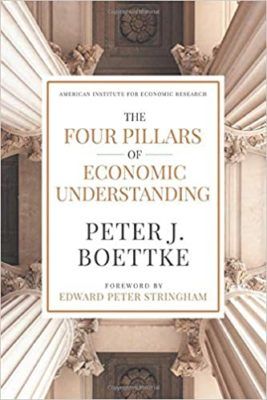Enterprise Should Be Permissionless
Prometheus didn’t ask permission for Zeus to bring fire to the humans. It cost him dearly, as Zeus punished him in a rather vicious manner. But human beings were made infinitely better off with fire.
Art Diamond’s forthcoming book, Openness to Creative Destruction (Oxford, 2019), relays this story to us precisely because he wants us to understand the great benefits that entrepreneurial innovation delivers for mankind, and how the true innovator is often despised and disrespected by the prevailing orthodox establishment.
If Prometheus had to get permission before giving fire to man, then man would have never gotten the benefits of fire. Similarly, if our entrepreneurial innovators had to get permission prior to introducing their innovations, we would still be walking around or perhaps at best riding on the backs of beasts but I doubt we would have seen the benefits of automobiles, let alone airplanes, and we would very likely not have modern conveniences such as indoor plumbing, let alone cell phones and the World Wide Web.
As Rear Admiral Grace Harper put it, it is better to ask forgiveness than to ask permission. This is particularly true when we think of who we have to ask permission from to innovate. As Michael Munger recently pointed out, we have to ask permission either from the monopoly experts of the government or from, ironically, our competitors.
Logic of Politics
This is the modern predicament. And we should always keep in mind the basic elementary logic of politics, which is to concentrate benefits on the well-organized and well-informed special interest groups in the short run and disperse the costs on the unorganized and uninformed masses in the long run, conflicts directly with the elementary logic of the market, which is to concentrate investment costs on specific decision makers and spread widely among consumers the benefits in terms of greater variety of products at lower costs.
The logic of politics runs into conflict with the logic of the market, and all the guns are on the side of politics. So unless we can effectively bind government, there will be a natural tendency to behave like Zeus: we demand that those seeking to innovate ask for permission, and when they don’t we penalize them severely. But, as Michael Munger points out, this is precisely why the question of permissionless innovation is so critical in the practical affairs of human societies. How this question is answered determines whether nations are rich or poor, whether nations that are currently poor have a pathway to becoming rich, and whether those that are rich will tragically spiral their way to being poor.
Innovation is a good thing, but it does take an intricate matrix of institutions that enable individuals to translate scientific knowledge into commercially useful knowledge, not to mention to encourage the discovery of new scientific knowledge in a routine way.
Humankind for most of history existed in a stagnated state, and the human capacity to be curious and creative was limited by the need to try to survive the ruthlessness of nature and the cruelty of other humans. Yet, we humans talk and tell stories, we are capable of cooperation as well as violence, and we are able to negotiate and bargain as well as maim and murder.
Deirdre McCloskey has of course addressed these issues with her study of the bourgeois era, and so has Joel Mokyr in a series of books initiated by The Levers of Riches but continuing with The Gifts of Athena and The Enlightened Economy.
Bet on Ideas
Economic progress is, as Diamond argues, a consequence of entrepreneurial innovation, but entrepreneurship in turn is a function of a host of factors that contribute to the unbinding of the entrepreneur from asking direct permission from the authorities or from potential competitors. It is a matter of having a segment of the population willing to bet on ideas and having the commercial practices be developed so those entrepreneurs can bring those bets to life.
Diamond’s book is a wonderful addition to the literature documenting with narrative tales as well as descriptive statistics how much entrepreneurial innovations improve the lives of ordinary human beings. The intent of the book is not to provide a theory of the entrepreneurial market economy, but to document the implications for the human condition of a thriving entrepreneurial culture.
In the very beginning of the book, Diamond explains about his teaching of standard economics and how after two-thirds of the class is through and he has exhausted the logic of choice, supply and demand, and the model of perfect competition, and thus the students have learned about the efficiency of the market economy, he stops and begins to talk to them about the real benefit of the market economy it is a ceaseless innovation machine. It brings more products at lower costs with a wider distribution that work better and last longer.
It brings products that do things that just a few years earlier were deemed as either too costly to provide, or nearly impossible to produce, or in some cases unimaginable.
The Missing Element
Again, what Diamond’s book does is provide us illustrations of each of these points. But what is missing is a full-blown theory of the competitive entrepreneurial market process and how the economic forces at work bring about constant adaptation and continual adjustment to changing circumstances.
It is not enough to point to Joseph Schumpeter, I would contend; it requires more work to integrate the entrepreneurial market process into the elementary logic of market theory and the price system — work that has been done, I would also contend, by scholars such as Armen Alchian, James Buchanan, Ronald Coase, Harold Demsetz, and Israel Kirzner.
One of the great insights of economic science and economic history is that we do not have to understand in order to experience the benefits of the competitive market process and the relentless pursuit of mutual gains from trade. Markets are omnipresent in all of human life, but the way that markets are structured and the extent of the division of labor in any society is institutionally contingent.
Certain arrangements are more conducive to productive and innovative entrepreneurship than others, more encouraging of the realization of productive specialization and peaceful social cooperation under the division of labor. Economics teaches us that institutions do indeed matter, but political economy teaches that it is ideas that either sustain or erode those institutions.
One of the most important of these ideas is permissionless innovation: the institutional environment that protects persons and property and the freedom of contract while enabling innovation and the dynamic social change of technological progress.
We can kill the goose that lays the golden eggs through shutting off trade and curtailing technological progress through the spread of bad ideas, and through corresponding public policies that result in perverse incentives and distorted information and block the social learning required for progress. Instead, we should always remember that, in the context of property and contract law, it is much better to ask for forgiveness than to seek permission.













